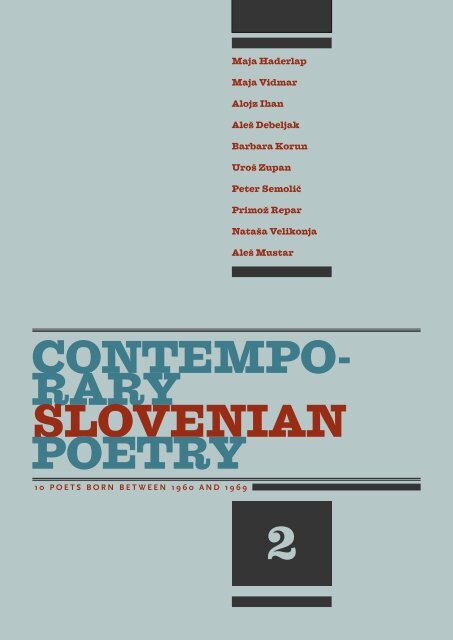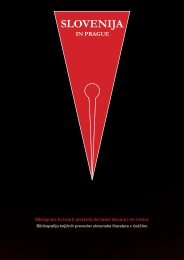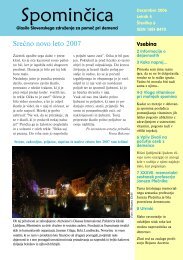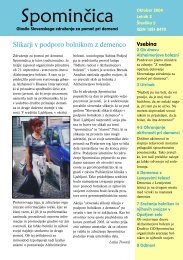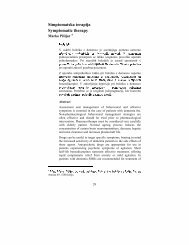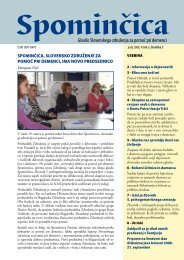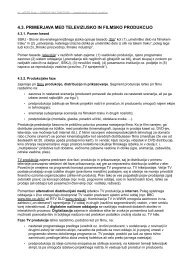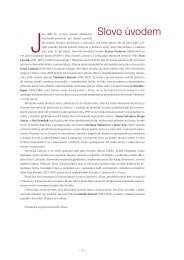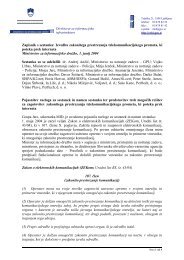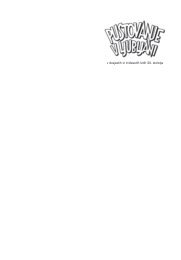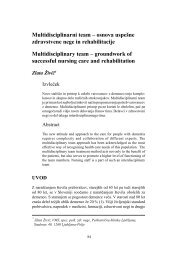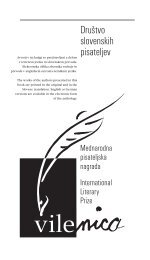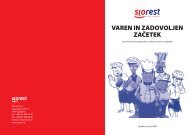Contempo- rary Slovenian poetry 2 - Ljudmila
Contempo- rary Slovenian poetry 2 - Ljudmila
Contempo- rary Slovenian poetry 2 - Ljudmila
Create successful ePaper yourself
Turn your PDF publications into a flip-book with our unique Google optimized e-Paper software.
Maja Haderlap<br />
Maja Vidmar<br />
Alojz Ihan<br />
Aleš Debeljak<br />
Barbara Korun<br />
Uroš Zupan<br />
Peter Semolič<br />
Primož Repar<br />
Nataša Velikonja<br />
Aleš Mustar<br />
1<br />
<strong>Contempo</strong><strong>rary</strong><br />
<strong>Slovenian</strong><br />
Poetry<br />
10 poets born between 1960 and 1969<br />
2
2<br />
Photo by Ursula Rausch<br />
Maja Haderlap (b. 1961 in Bad Eisenkappel/Železna<br />
Kapla in Carinthia/Austria) is a poet, playwright and<br />
translator. Recently she has also started to write prose.<br />
She lives in Klagenfurt/Celovec, Austria. She studied<br />
Theatre Studies and German Language and Literature<br />
at the University of Vienna. After completing her<br />
doctorate, she worked as a theatre dramaturge and<br />
university lecturer. In the 1992-2007 period she was<br />
Senior Dramaturge at the Stadttheater of Klagenfurt.<br />
Haderlap was for many years the co-publisher and editor<br />
of the Carinthian-<strong>Slovenian</strong> lite<strong>rary</strong> journal Mladje<br />
(Young Branches). She has published three volumes of<br />
<strong>poetry</strong>: two cycles of poems written in <strong>Slovenian</strong>, Žalik<br />
pesmi (Mythical Poems, 1983) and Bajalice (Dowsing<br />
Rods, 1987) and a large volume of collected poems in<br />
three languages entitled Gedichte Pesmi Poems (1998),<br />
which for the first time contained her poems written<br />
in German. In 2007 she published a commemorative<br />
publication: Das Stadttheater Klagenfurt. Die Ära Dietmar<br />
Plegerl 1992-2007. She has received several awards for<br />
her lite<strong>rary</strong> work, including the prestigious Prešeren<br />
Foundation Award and the Förderpreis zum Hermann-<br />
Lenz Preis.<br />
Maja<br />
Haderlap
what used to be<br />
once a year,<br />
when bookmarks<br />
tumble from my books,<br />
bearing notes like<br />
counter ferns,<br />
recorder carnations,<br />
nettle clips,<br />
I return to my village.<br />
upon the open pages<br />
the stories turn yellow.<br />
they have become legends<br />
and laid down their weapons:<br />
the mockery, the turmoil,<br />
the sweat of the dance<br />
that dripped<br />
from the dancer’s temples.<br />
I put on my red old red pinny,<br />
push my hair back<br />
over my head like a bush<br />
and wear dirty socks<br />
and boots that would fit a man.<br />
I smell the pork fat<br />
in the unaired kitchens<br />
and try out names<br />
and their shadow-stories.<br />
once triggered off<br />
they crash and boom<br />
like drifting timber.<br />
3<br />
at the yard entrance<br />
I stand still,<br />
there I have placed a stone<br />
beside a furrow in the lime,<br />
to remind me<br />
of where I came from.<br />
piran<br />
there’s a coming and a going in the neighbouring house,<br />
but the spindle-tree keeps me well beyond their glances.<br />
the paths that lead from the overgrown garden<br />
are followed only by cats, toads and snails.<br />
loudly the sea shakes off its stinking cloak.<br />
on my writing desk, invented characters<br />
rehearse their missing dialogue.<br />
I sit here, as if at the bottom of some old distress,<br />
press air into memory cells<br />
to keep it alive, walk in the evenings<br />
across piazza tartini and in the morning
come with fresh melons from the market.<br />
twice a week frida drops by.<br />
why don’t you get married, she calls from the bushes,<br />
it’s better than being lonely, at least!<br />
today a toad will lose its warts<br />
because I shall kiss it, I say.<br />
then, my dear poetess, I’d like to be<br />
a witness at your wedding.<br />
yet another door swings shut.<br />
alias<br />
I have learned road maps by heart - and<br />
long-forgotten paths. my skin is taut and white,<br />
as if dyed with sand-lime. under my fingernails<br />
horsestail buds burst open like signposts.<br />
words hum in the tent of skin I bear before me<br />
as a protective sign, as a deceptive mask.<br />
I beat my drums and let the rockets rise,<br />
they flare up dangerously beneath the surface of skin.<br />
one breath of air might tear the mask<br />
from my body. but there’s none blowing yet,<br />
and people still think they recognise me.<br />
when my name is uttered and falls there should be<br />
a white rag in the landscape. I was here.<br />
4<br />
night woman<br />
Translated by Peter Waugh<br />
I lie on the kitchen table<br />
and listen to noises. a door is opened<br />
and light ushered into the room.<br />
cushions and boots are piled,<br />
metres-high, upon an unlit stove. now<br />
I want to see where you let her sleep,<br />
your wife calls. you come first,<br />
and with a smile caress<br />
the walls and me.<br />
I seek refuge outside in the garden,<br />
hear someone shout,<br />
she loves you, she just doesn’t know it!<br />
it’s raining on one side of the house.<br />
***<br />
again i write letters<br />
the days stretch like laughter in varnish<br />
across the yellowing grass<br />
the summer burst out with its belly<br />
like a glut of water turned out of a barrel<br />
sometimes it stinks of dung-water<br />
again i write letters
even say stay tonight<br />
let your hair grow<br />
on my sofa have<br />
your teeth taken with wild kisses<br />
houses grow out of my hands<br />
when i love you<br />
one for the holiday<br />
one for the torn out hair<br />
one for the fugitive peace<br />
which strays and sleeps with us<br />
when we are alone<br />
whatever wants to come, ought also to come<br />
have already planted flowers for the autumn<br />
call them red xanthippes and if you come<br />
for tea today i ask you sing for me<br />
this sad song soncek cez hribcek gre*<br />
* the sun crosses the hill<br />
***<br />
Translated by John L. Plews<br />
it could be a woman<br />
showing me the way to the village<br />
that i’m looking for. it could be a village<br />
with lodgings for strangers<br />
and pairs of eyes to be counted.<br />
it could be a village<br />
with hoes and spades, well known to me.<br />
but in the night my mother comes.<br />
she points into the valley. none of that<br />
belongs to us, she says.<br />
my suitcases are standing packed<br />
in front of her door. i recite verses<br />
about arriving.<br />
they aren’t songs or laments,<br />
only a loose sound.<br />
5
6<br />
Maja Vidmar (b. 1961)<br />
studied comparative<br />
literature in Ljubljana,<br />
where she currently<br />
lives as a freelancer. She<br />
has published several<br />
collections of <strong>poetry</strong>:<br />
Razdalje telesa (Distances<br />
of the Body, 1984), Način<br />
vezave (Ways of Binding,<br />
1988), Ihta smeri (Urge<br />
of Direction – Selected<br />
Poems, 1989), Ob vznožju<br />
(At the Base, 1998),<br />
Prisotnost (Presence,<br />
2005) and Sobe (Rooms,<br />
2008). Her selected<br />
poems in the German<br />
translation were awarded<br />
the Hubert-Burda-Stifung<br />
Prize. For her book<br />
Prisotnost she received<br />
the Prešeren Foundation<br />
Award, the Jenko Prize<br />
and the Grosser preis für<br />
osteuropäische Literatur<br />
(Vienna).<br />
Photo by Tone Stojko<br />
Maja<br />
Vidmar<br />
Books in translation<br />
Akt, Zagreb: Meandar,<br />
1999<br />
Liebhaftige Gedichte, Graz:<br />
Droschl, 1999<br />
Gegemwart, Wien: Edition<br />
Korrespondenzen, 2007<br />
Molitva tijela, Sarajevo:<br />
Tugra, 2007
The Couple<br />
We are alone<br />
on a deserted island.<br />
Waiting for a ship<br />
that may not come.<br />
We are alone,<br />
a woman and a man.<br />
He is nothing in particular,<br />
with particularities,<br />
not my thing,<br />
but on an island there is no other,<br />
neither for me nor for him.<br />
We are alone<br />
on a deserted island.<br />
Every day stretched on the rack<br />
between yes and no.<br />
Every day is worse<br />
than sex.<br />
Worst of all is the fear<br />
that I will spot the ship<br />
and the shore will have to be<br />
abandoned in the middle of the movie.<br />
Each day is a gift<br />
of delay.<br />
The House<br />
7<br />
With father’s milk<br />
I drank<br />
the solid architecture<br />
of the house,<br />
and yet in these rooms<br />
every evening<br />
I covered up my head.<br />
There was no doubt:<br />
out in the open they would<br />
have come, those who are not,<br />
they would have devoured me.<br />
It is hard<br />
with a house in your head.<br />
In the evening I sit<br />
at the back door<br />
crying out for them,<br />
those who are not.<br />
Idyll<br />
It’s no coincidence that you and I<br />
and the two children found ourselves<br />
in the lift. Even when
I was little,<br />
it was loveliest<br />
in the car, where<br />
we were all within<br />
arm’s reach. The lift<br />
crunched like<br />
a fresh sugar wafer.<br />
We said to the children,<br />
it’s alright, it’s alright,<br />
and really, it didn’t hurt.<br />
Just moments before,<br />
I was grateful for<br />
the experience.<br />
Isaac<br />
8<br />
When Isaac sleeps<br />
I cover his little wings,<br />
I watch him breathe<br />
and smell him<br />
as though he were mine.<br />
When Isaac waves to me<br />
I warn him across the street,<br />
trembling,<br />
as though he were mine.<br />
For I let him go,<br />
touching wood<br />
every day I let him go<br />
among the beasts.<br />
How do I say,<br />
as though I didn’t care,<br />
Isaac, come,<br />
let’s climb the high mountain.<br />
How do I search for a chopping block,<br />
a smooth, clean chopping block<br />
for him.<br />
How do I take a knife<br />
as though I didn’t care,<br />
take a naked, grey knife—<br />
how do I cut him off<br />
so alive.<br />
Isaac, come, let’s go.<br />
The Means<br />
Use ordinary words<br />
and worn-out metaphors<br />
the way I do.<br />
Use betrayed loves<br />
and bloody, limp hands
the way I do.<br />
Use hopeless flights<br />
of tired pigeons<br />
and this burnished stone,<br />
about the only thing above water,<br />
the way I do.<br />
Use numb legs<br />
on your way into the water,<br />
and the fear there is no way out<br />
the way I do.<br />
Use my imminent death<br />
the way I<br />
use it:<br />
just to hear our whispers<br />
to each other,<br />
preferably, using ordinary words.<br />
I. Nigredo<br />
Outside the big window<br />
the crazed caretaker<br />
is cutting off<br />
little black paws.<br />
Dismembered wolves,<br />
scattered all around,<br />
fertilize<br />
the school garden.<br />
I run away<br />
so I won’t be noticed<br />
behind the glass<br />
by the merciless gardener.<br />
9<br />
III. Albedo<br />
Translated by Ana Jelnikar<br />
& Kelly Lenox Allan<br />
The whiteness<br />
of a frozen night.<br />
A small skittish animal<br />
rests<br />
its fear.<br />
My little red paw<br />
lives in<br />
an iron snare.<br />
Moonlight<br />
and three footprints<br />
in the snow.<br />
That way!
Alojz Ihan (b. 1961) graduated from the Faculty of<br />
Medicine of the University of Ljubljana, holds a Ph.D.<br />
degree in Immunological Sciences and is a Specialist in<br />
Clinical Microbiology and Immunology. He is currently<br />
employed as a Professor of Medical Microbiology and<br />
Immunology at the Faculty of Medicine of the University<br />
of Ljubljana. The lite<strong>rary</strong> work of Alojz Ihan comprises<br />
six books of <strong>poetry</strong>: Srebrnik (Silver Coin, 1985), Igralci<br />
pokra (The Poker Players, 1989), Pesmi (Poems, 1989),<br />
Ritem (Rhythm, 1993), Južno dekle (Southern Girl, 1995),<br />
Salsa (Salsa, 2003). He is the author of two novels: Hiša<br />
(The House, 1997), Romanje za dva … in psa (Pilgraming<br />
for Two… and the Dog, 1998) and two essay books: Platon<br />
pri zobozdravniku (Plato at the Dentists, 1997), Deset<br />
božjih zapovedi (Ten Commandments, 2000). Ihan also<br />
writes cultural essays and opinions in several of the most<br />
popular <strong>Slovenian</strong> journals and newspapers. For his<br />
lite<strong>rary</strong> work he has received several important national<br />
awards.<br />
10<br />
Photo by Vlado Žabot<br />
Alojz<br />
Ihan<br />
Books in translation<br />
Srebrnjak, Zagreb:<br />
Goranovo proljeće, 1985<br />
Igrači na poker, Skopje:<br />
KMM, 1987<br />
Acerca de un rincón seguro,<br />
Tarazona: La Casa del<br />
traductor, 1999<br />
Ritmo, Madrid: Hiperión,<br />
2000<br />
El ritmo del mundo,<br />
Ljubljana: Verba<br />
hispanica, 2001<br />
Salsa: wiersze wybrane,<br />
Port Legnica: Biuro<br />
Literackie, 2003
Casting out the devil<br />
Bought at an antique store a very old book,<br />
found in it a recipe for casting out the devil,<br />
so shopped for frogs, crones hair, animal eyes,<br />
lead, roots of bident, dried, and some other<br />
essentials, combined and cooked, like it says,<br />
rubbed it under the armpits, on my thigs,<br />
sprayed the walls of the appartment, had as a result<br />
a heckuva fight with The Woman, then she<br />
stomped out of the place mad as Beelzebub.<br />
Loves from afar<br />
How fascinating are these loves from afar and unspoken<br />
That exist with no real story to them, unnoticed<br />
Somebody buying vegetables always in the same store<br />
At exactly four o’clock, each afternoon, the bell jingles<br />
And it’s “Good day,” and the girl behind the counter will say<br />
“Yes, what would you like today?”<br />
And then it’s all pears and vegetables and fruit from the south in surprisingly few words<br />
Though the fashion in fruit and vegetables changes yearly<br />
But, no, he always likes his red delicious, his pomegranates, his unripe bananas<br />
And in vegetables: eggplants, squash, lettuce of the season, and onions, nothing earthshaking<br />
Though it’s not clear why precisely at four he has to go into the very same store<br />
If he ever thought about it, he’d be amazed, as he would if he asked himself<br />
Why for years, not years, decades he hasn’t wanted to move out of the apartment<br />
11<br />
Which, let’s face it, is damp and too expensive for what he earns<br />
And nothing about it is really cosy, to spur one to singing in the shower<br />
Or doing calisthenics standing up in the living room<br />
Because there is always a heavy fog rolling in<br />
And who can really feel at ease when unable to see his feet and under them solid ground<br />
Without that feeling every step you take is tortured searching<br />
For the precipice’s edge, a tense watchfulness on the part of the hands<br />
That at the last minute they might grab hold of something, anything<br />
Or shield the eyes, at least, when the buried land mine left over from the last war explodes<br />
If he really, if he truly gave all that some thought, he’d wonder why he doesn’t want to leave<br />
And close the books in the accounting office, where the calculations and the numbers every day<br />
Revolve with the same rhythm around the giant zero, like planets the explosion of the dying sun<br />
Will swallow five million years from now, but till that day the same old rhythms will recur<br />
If he ever thought, really thought, about it he might ask himself if he does not not quit<br />
Only because it would then no longer be so it-goes-without-saying necessary<br />
To buy his vegetables and his fruit in just that store, in which each day, the girl behind the counter<br />
Says to him, “Yes, and what would you like today?”<br />
Even though she may the while be getting fruit for someone else<br />
Because it’s rare, really, that a clerk will meet a client so kind, who just shyly waits<br />
And then clearly and distinctly desires the red delicious and the green bananas<br />
Like a, like a very precise plumber who stays faithfully in the territory assigned to him<br />
If the girl behind the counter were more confident of this, she might even ask him for a favour<br />
Because it’s very useful having for a plumber a man you see every day<br />
Whom you can trust to turn up every day at four, no matter the sort of day it is<br />
To turn that smile on and that respect that people in sales do so, so miss<br />
Standing behind the counter every day, not understanding why somebody will out of the blue
Start giving them shit about the apples being too soft, because this somebody<br />
Ever since he was a kid liked them hard, why do people expect that strangers<br />
Will fulfill precisely the desires not even their mothers ever suspected they had<br />
That’s why the girl behind the counter likes her plumber who comes exactly at four<br />
It’s why she too takes the bus every day to the other side of town to come to her store<br />
Though she could long ago have found another, closer to her house, through whose<br />
Display window she could see the front door of her house, through which<br />
Her husband would be coming home, and he’s not even close to being as reliably precise<br />
As the client who comes every day at four to ask respectfully for<br />
The red delicious and the kilogram of onions, and in the silence which follows both know<br />
Full well, that that is exactly as it should be, and any further word would be too much.<br />
Apple<br />
12<br />
As soon as I came on guard duty, the little girl<br />
began to act strange. She stood by the trench which<br />
surrounded the barracks, she was maybe six, or seven,<br />
wearing the wide trousers - red - had black hair, a real, real<br />
little Albanian girl; as I began to walk alongside the trench, she began<br />
marching in the same direction herself; soon I could see<br />
she was mimicking my every step, even my posture; she was playing<br />
my shadow and I became nervous, there could have been<br />
irredentists nearby waiting for the little girl<br />
to make me inattentive. So I motioned forhere to<br />
leave, at once. She halted, than she laughed,<br />
reaching into her satchel, and pulled out an apple.<br />
She swung her arm and threw the apple toward me. I jumped<br />
behind a shelter, hugged my automatic, waited<br />
There was no explosion. I lowered the barrel. “I won’t<br />
shoot the little girl,” I told myself, “she doesn’t understand.”<br />
Then I watched the apple, big, red, it looked totally authentic.<br />
I made a threatening motion in the little girl’s direction, she<br />
became frightened and started to run away. I didn’t know what<br />
to do with the apple. It could have been injected<br />
with poison; if I bit into it, I might die or at least fall asleep,<br />
and then the irredentists would cross the trench and butcher me.<br />
I didn’t know if the poison worked at the mere touch, and so,<br />
as a precaution, I did not touch the apple, nor did I kick<br />
it into the trench, I just stood there and waited,<br />
helpless. It seemed to me that these things were too big<br />
and too complicated for me and that I should realy report everything<br />
to the commandant; if I sounded the alarm, all my worries<br />
would be over, the siren would howl, and there we’d all be,<br />
elbow to elbow in the trenches, guns at the ready.<br />
Really, I didn’t know what to do and I became so nervous<br />
it almost hurt. Then, luckily, the next watch came.
God could not keep a straight face<br />
God could not<br />
Keep a straight face<br />
Sewing big gay wings for the butterflies<br />
For their busy fluttering around flowers<br />
Not to mention when he was honing bird beaks<br />
And buffing the glitzy fish scales<br />
Nor could he hold it in<br />
Faced with his pig snouts, with elephant trunks.<br />
I needn’t tell you how it was with man<br />
No happier creation is there than the red tongue<br />
Swishly dancing around teeth<br />
Spraying words like a sprinkler on a lawn<br />
Each truth of the world is joyfully easy to master<br />
Nor is there love that the tongue cannot<br />
Prattle or hosanna about<br />
Though, yes, for entirely new words you do occasionally need<br />
Speech therapists<br />
Worse is what happens to humans by love surprised<br />
The suddenly mute, because now there’s no word for it<br />
Though the weirdo will insist on going where no word can go<br />
When the only way out is honest stuttering<br />
You can, you can teach the tongue<br />
The words for that fear and the words for that love<br />
And words for filler, which bring a smile to the lips<br />
For each truth of the world is joyfully easy to master<br />
And love is the game when God just couldn’t<br />
Hold it in anymore.<br />
13<br />
Wild Geese<br />
Translated by Tom Lozar<br />
I know that you were somewhere among<br />
The flight of geese flying south<br />
I stood waist-deep in the marsh, gun against my cheek<br />
And the geese like a storm cloud covered the sky<br />
I know you had to be among that swarm somewhere<br />
For, for the longest time, I’ve dreamt nothing but you<br />
And it is clear why, motionless in the marsh, I<br />
searched and sought among the feathered bodies, and waited<br />
For the finger to squeeze, for the shot to slash the air<br />
Then one of the feathery bodies vortexed<br />
And fell at my feet<br />
It was warm and at peace when I touched it<br />
Then I awoke and now I don’t know<br />
Where you were among the flight<br />
That like a storm cloud covered the sky<br />
In my dream.
Aleš Debeljak (b. 1961) graduated in comparative<br />
literature from the University of Ljubljana and received<br />
his Ph.D. in Social Thought from the Maxwell School of<br />
Citizenship and Public Affairs, Syracuse University, New<br />
York. He was a Senior Fulbright fellow at the University<br />
of California, Berkeley and a fellow of the Institute of<br />
Advanced Study - Collegium Budapest. Debeljak has<br />
published twelve books of essays and seven books of<br />
poems in his native <strong>Slovenian</strong>. A translator of a book<br />
of selected poems by John Ashbery and a book on the<br />
sociology of knowledge, he has also edited an anthology<br />
of American metafiction and published a book of critical<br />
essays on American literature. He won the Prešeren<br />
Foundation Prize, the Miriam Lindberg Israel Poetry for<br />
Peace Prize, the Chiqyu Poetry Prize and was named<br />
Ambassador of Science of the Republic of Slovenia. He<br />
has edited Serbian, Croatian and <strong>Slovenian</strong> sections for<br />
Shifting Borders: East European Poetries in the Eighties and<br />
Prisoners of Freedom: <strong>Contempo</strong><strong>rary</strong> <strong>Slovenian</strong> Poetry. A<br />
founding editor of the Sarajevo Notebooks magazine and<br />
a contributing editor of the Verse magazine, Debeljak<br />
is also a general editor of Terra Incognita: Writings from<br />
Central Europe, a series of books published by White Pine<br />
Press, Buffalo, New York.<br />
Photo by Erica Johnson Debeljak<br />
14<br />
Aleš<br />
Debeljak<br />
Books in translation<br />
Rječnik tišine, Zagreb:<br />
Quorum, 1989, 2002<br />
The Chronicle of<br />
Melancholy,<br />
Chattanooga: Poetry<br />
Miscellany, 1989<br />
Slownik Ciszy, Krakow:<br />
Cassiopeia, 1992<br />
Momenti d’Angoscia,<br />
Napoli: Flavio Pagano<br />
Editore, 1993<br />
Anxious Moments,<br />
Fredonia: White Pine<br />
Press, 1994<br />
A csend szotara, Pecs-<br />
Budapest: Jelenkor<br />
Kiado, 1996<br />
Katalog prachu, Olomouc:<br />
Votobia, 1996<br />
Shisyuu fuan na jikoku,<br />
Tokyo: Kashinsya, 1997<br />
Grad i djete, Zagreb:<br />
Meandar, 1998<br />
Mesto a dite, Prague:<br />
Mlada Fronta Press,<br />
1999<br />
The Dictionary of Silence,<br />
Santa Fe: Lumen Press,<br />
1999<br />
The City and the Child,<br />
Buffalo, New York:<br />
White Pine Press, 1999<br />
Miasto i dziecko, Krakow:<br />
Zielona Sowa, 2000<br />
Minutes de la peur,<br />
Pézenas: Domens, 2001<br />
Skice za povratak: izabrane<br />
pesme, Banja Luka –<br />
Beograd: Zadužbina<br />
Petar Kočić, 2001<br />
Netobula žoždio aistra,<br />
Vilnius: Lietuvos<br />
Raštoju Sajungos<br />
Leidykla, 2001<br />
Kaupunki ja lapsi,<br />
Helsinki: Nihil Interit,<br />
2002<br />
Izabrani Pesni, Skopje:<br />
Blesok, 2004<br />
Ispod povrsine, Zagreb:<br />
HDP, 2006<br />
La ciutat i el nen,<br />
Barcelona: Edicions La<br />
Guineu, 2006
A Letter Home<br />
I long for a comfort that cannot be measured,<br />
forgotten caves where Bach can’t reach,<br />
the bell that sounds for a monarchy<br />
not found on any globe, for the feverish<br />
concentration of hunters who oil<br />
and polish their guns. I long for the salt<br />
that tears contain, the marrow that boils<br />
in my bones, I long for the miracle opening up<br />
like a mouth when nothing comes out.<br />
If I am the only one listening, the percussion<br />
of grace in my loins is what I become,<br />
pulling the trigger like no one has taught me<br />
and no one would know how to gauge.<br />
Alone on a trail that nobody knows<br />
I follow the line of your neck. Your head<br />
is tilted back, I give myself to whatever it is<br />
that strains my muscles and forces me<br />
to flower like the scatter a shotgun fires,<br />
singing at last from a single place<br />
called Rome, Medina, Jerusalem,<br />
which is home to me<br />
as only one place can be.<br />
Cast Vote<br />
That crystal morning, snow over snow:<br />
in capital cities they might be ashamed of it.<br />
That conference of birds, and light upon water,<br />
the parliament of dreams, and knowing no fear<br />
of getting old, and she, alone this winter<br />
morning, her face that sees itself within<br />
a flower etched by ice along the glass,<br />
her reflection thawing and piercing<br />
the window: she is austere and never so strange,<br />
outside her shadow sputters again<br />
like a match refusing gravity and singe.<br />
In the vast expanse of frost and worry,<br />
not even a minute to think, she was the one<br />
with the courage to disobey silence,<br />
she could not be voted down and said:<br />
Look, in the shallows of this common river<br />
the Black Sea claims as its own,<br />
fish still wriggle out of a boy’s hands, tracing<br />
a perfect arc, and with them everything<br />
that flows, everything that falls, rushes<br />
without reason as one’s childhood rushes by—<br />
look: we are not a wall but a shutter<br />
some far-off god is opening halfway.<br />
15
Hymn to the Favorite City<br />
16<br />
The ground is soaked with weeks of high water,<br />
and thieves of sanctuaries beside the lagoon<br />
are on the run, my eyes following them everywhere,<br />
somewhere close, a robin’s breast collapses<br />
under the pressure of a thumb: only a little while<br />
before the dock a black boat leans against<br />
is covered with drops of blood, useless<br />
as a song two people can hardly hear. Well,<br />
maybe it’s merely a melody without words.<br />
This city has baptized a dozen generations<br />
in the sacrament of war, but I go on<br />
all the same. As if I had a choice.<br />
The harlequin from the Palazzo Grassi,<br />
the one who inspired Picasso, has meaning for me<br />
only when I see you rendered blue,<br />
faint and luxurious, with the violence<br />
beauty uses to enter certain homes:<br />
indivisible, unable to end, like a cloud<br />
that houses thunder, beneath which I work<br />
my memory’s weakness, widen channels<br />
and clear out passageways, so the voice<br />
that surges out of you can spill downstairs<br />
to the living room, and cross the yard<br />
in a rush basket I can barely see.<br />
Carried by the echo through whirlpools<br />
and across the shores of death, it says: no.<br />
Grass Psalm<br />
Seekers after sources and rivers,<br />
messengers of useless desires, traveling<br />
merchants, a spider in its web:<br />
they keep me company this early<br />
evening hour, in the privacy of a groggy soul<br />
who stands and smokes and three kids<br />
sleeping upstairs. In a dream, my years<br />
of devotion grind by, and images evolve<br />
less real than I would want. Look at it:<br />
translucent it reveals itself, is not<br />
the least bit shy, radiates like an apparition<br />
over a desert discovered by others;<br />
but all the same it suits me, so big<br />
and unsatisfied, like a monologue<br />
running without a break, it lasts<br />
as long as the pain of harvest grass<br />
when left to rot. Look at me as I tremble,<br />
you cannot miss how I reach for you,<br />
my partner I do not know. Yet you alone<br />
can fix my sight, you’re a welcome<br />
guest in every house, you detect<br />
the failures in my speech, you forgive<br />
the stutter that I is me.
Drowned Love<br />
Translated by Andrew<br />
Zawacki and the author<br />
You burn me, this is my weakness.<br />
I admit: I can’t stand that everything,<br />
everything —words and bodies— passes<br />
from hand to hand. Like a walk<br />
down to the three bridges, past bookstores<br />
and the ornaments almost invisible<br />
on each façade, past the stains<br />
on violins, shiny and hard<br />
like madness, past the palaces<br />
in no hurry to be restored,<br />
an orchestra playing day after day<br />
in another gazebo, another park,<br />
when I lost my way among the streets<br />
and wandered, ignorant, under the dome<br />
of another sky, in another dream,<br />
which threatens and seduces<br />
just like you, you who lure<br />
a trout to your hips, you who foretell<br />
how memories twist in the genes.<br />
You burn me, this is my weakness.<br />
Like an omen I can’t dismiss.<br />
A hand to another hand. Tears,<br />
I know this too well, tears<br />
don’t run down the cheeks,<br />
they’re oil a downpour can’t wash off<br />
and high tide breaks against the soul<br />
in vain. There’s nothing else I can do:<br />
I give you up to the current,<br />
and I do it out of love. You vanish<br />
into pain, a strange joy, and nothing.<br />
17
Photo by Tone Stojko<br />
Barbara Korun (b. 1963) took a degree in the <strong>Slovenian</strong><br />
language and comparative literature and taught literature<br />
at high schools. She works at the <strong>Slovenian</strong> National<br />
Theatre in Ljubljana as a language advisor. Her collection<br />
Ostrina miline (The Edge of Grace, 1999) received the<br />
National Book Fair Award for a debut collection. Her<br />
other collections of <strong>poetry</strong> & prose poems are Zapiski<br />
iz podmizja (Notes from under the Table, 2003),<br />
and Razpoke (Fissures, 2004). A leading figure in a<br />
generation of radical young women poets, her work has<br />
been published in many anthologies and reviews in<br />
fourteen languages.<br />
18<br />
“The short, imagistic poems rip into the senses and change<br />
the perceptions of the reader, time and time again. Barbara<br />
Korun’s direct voice is haunting and full of surprises. There is<br />
a surrealistic tone to the poems – Korun dwells in myth, the<br />
animal world, and relationships between men and women as<br />
she builds upon human frailty to establish fresh dimensions<br />
beyond it.” (Bloomsbury Review, Oct. 2005)<br />
Barbara<br />
Korun<br />
Books in translation<br />
Chasms, Chattanooga:<br />
Poetry Miscelanny, 2003<br />
Songs of Earth and Light,<br />
Cork: Southword<br />
Editions, 2005<br />
Krilati šum, Zagreb:<br />
Naklada Lara, 2008
The Moon Will Cover Me<br />
I have two animals,<br />
A red one and a blue one.<br />
When the blue one drinks,<br />
the red one goes rushing about –<br />
and vice versa.<br />
I never can catch them, torn as I am<br />
between the resting one and the rushing one.<br />
I float a thought for bait,<br />
far, far out over the plain.<br />
They take no notice,<br />
their snouts sniffing the infinite.<br />
I will lay myself down in the long grass,<br />
close to a well, and sink into sleep.<br />
The moon will cover me.<br />
They will come in the morning<br />
with the first horizontal light,<br />
tired, sweaty, foam on their muzzles.<br />
Then we will go together to drink water.<br />
Lioness<br />
The lioness is my love for you, the tawny lioness<br />
with her golden skin, her golden eyes.<br />
She walks by my side always;<br />
when I sit down to rest she lies beside me,<br />
her face by my leg like a loyal dog.<br />
I play with her, I lie down between her great paws<br />
and let her toss me like her cub.<br />
I feel the weight of her great paws,<br />
the sharp precision of her claws.<br />
I taste dead meat on her breath.<br />
19<br />
Now she is dying, the tawny lioness.<br />
More and more she falters behind me,<br />
hurrying to catch up with me when I rise.<br />
I see the clotted blood that beads her snout.<br />
She lies there on her side, she raises<br />
her yellow, waning gaze to me.<br />
I ask her: Where has your strength gone?<br />
Where has your voice disappeared to?<br />
I lay myself down between her weary paws,<br />
I close my eyes with hers.
Stag<br />
I wake to a warm stag’s tongue between my legs,<br />
the evening light comes horizontal in through open doors.<br />
Gently he nuzzles my breasts, this stag, and licks me,<br />
his coarse tongue warm on my vulva, my breasts, my face.<br />
His scent intoxicates me – earth, moss, fear and decay –<br />
the raw odour of instinct.<br />
He lies down beside me against my smooth belly,<br />
I run my hands over his matted hair.<br />
He holds his head proud, he gazes away from me into the woods.<br />
His bare penis is reddening in the shadows of dusk.<br />
Time thickens. I reach out into the dark, I touch a man’s body.<br />
Desire flares in me, I am suddenly all heat.<br />
He makes love to me simply, directly; he holds me close.<br />
In his hands are the north wind and the south wind.<br />
Rivers and oceans run through his body.<br />
His mouth is warm and full of summer rain.<br />
The room fills with songs of earth, of beyond our earth.<br />
Sometimes a flash of moonlight reveals his face.<br />
20<br />
He does not look me in the eye, he protects me from himself.<br />
Sometimes when he is with me I no longer feel the ground.<br />
Sometimes lust pools in his navel like a clear spring.<br />
Sometimes he fountains, spewing lava.<br />
He never hurts me.<br />
With infinite care he turns me belly down on to the earth,<br />
when he bites my neck and I smell his hot breath I know<br />
I am to be spared.<br />
With the coming of dawn I feel small horns in his hair.<br />
Fur sprouts from his head to his back, his rump.<br />
On his belly are sudden tufts of bestial grass.<br />
He has a stag’s head at daybreak, his eyes on me barely human.<br />
Eyes from the other side of the frontier.<br />
Absent-minded, his hands of horn caress me.<br />
I watch his antlers burgeon and spread.<br />
The scent of morning flushes the hut, he stands to go.<br />
One brief glance at me as I stand in the door<br />
and I am split in two, I fall to the ground in flame.<br />
I listen to the pock of sharp hooves going away,<br />
I feel how my burnt halves are putting out flowers.<br />
Sisyphus<br />
Through my dreams,<br />
you roll a stone.<br />
My body,<br />
my heart,<br />
groan in sleep.<br />
You roll the stone,
your eyes<br />
two slits of dark.<br />
Above,<br />
a surprise to me<br />
over and over again,<br />
you pounce on the stone<br />
like an animal,<br />
a body delighting<br />
in movement;<br />
when I catch up with you<br />
you are already panting<br />
in happy exertion.<br />
Through my dreams<br />
you roll a stone,<br />
under my ribs the echo<br />
of your terrible footfall.<br />
Birth of an Angel<br />
I gave birth out of a swelling on my breast, my third breast,<br />
long hidden under scarves and shawls. It hurt as it came. He<br />
helped me with his broad hands, he who husks out the shape<br />
of souls. I saw a small being, the size of a fist, covered all over<br />
with down, white and sticky. First you must let it dry, he said,<br />
warming the creature between his big fingers. I could see as it<br />
dried that this tiny being was wrapped in wings much bigger<br />
than itself. It didn’t live, it couldn’t, it didn’t want to live. Apparition,<br />
sea-foam, it melted in our hands.<br />
21<br />
Mirror<br />
Translated by Theo Dorgan<br />
and Ana Jelnikar<br />
A man leans over me<br />
as over water.<br />
He wishes to see his face<br />
in my water mirror<br />
but my water is dark,<br />
dark and deep, will not<br />
give back his reflection.<br />
He searches, surprised<br />
then amazed, and I am afraid<br />
he will jump in, jump into me,<br />
and find staring back at him<br />
his own face there,<br />
dead.
22<br />
Photo by Tomaž Berčič<br />
UROŠ<br />
ZUPAN<br />
Books in translation<br />
Beim Verlassen des<br />
Hauses, in dem wir uns<br />
liebten, Salzburg, Wien:<br />
Residenz Verlag, 2000<br />
Pryzgotowania do nadejscia<br />
kwietnia, Krakow:<br />
Zielona Sowa, 2001<br />
Pripreme na dolazak<br />
travnja, Zagreb: Konzor,<br />
2002<br />
Otvaranie delty, Bratislava:<br />
F.R.&G, 2004<br />
Beim Verlassen des<br />
Hauses, in dem wir uns<br />
liebten, Wien: Edition<br />
Korrespondenzen, 2005<br />
Immer bleibt das Andere,<br />
München: Carl Hanser<br />
Verlag, 2008<br />
Uroš Zupan (b. 1963),<br />
a poet and essayist,<br />
graduated in comparative<br />
literature from the<br />
University of Ljubljana.<br />
He has won numerous<br />
prizes including:<br />
Best First Collection<br />
Award, the Prešeren<br />
Foundation Award,<br />
the Jenko Prize, the<br />
Župančič Prize, Herman<br />
Lenz Preis, Premio<br />
della VI Edizione del<br />
Festival Internazionale<br />
di Poesia (Genova) etc.<br />
He has published eight<br />
collections of <strong>poetry</strong> and<br />
four books of essays.<br />
His <strong>poetry</strong> titles include<br />
Sutre (Sutras, 1991), Reka<br />
(River, 1993), Odpiranje<br />
delte (Opening of<br />
Delta, 1995), Nasledstvo<br />
(Succession, 1998), Drevo<br />
in vrabec (A Tree and a<br />
Sparrow, 1999), Nafta<br />
(Oil, 2002), Lokomotive<br />
(Locomotives, 2004) and<br />
Jesensko listje (Autumn<br />
Leaves, 2006). The books<br />
of essays are: Svetloba<br />
znotraj pomaranče (Light<br />
inside an Orange, 1996),<br />
Pesem ostaja ista (The<br />
Song Remains the Same,<br />
2000), Pešec (Walker,<br />
2003), Čitanka Panini<br />
(Textbook Panini, 2007).<br />
He has translated several<br />
poets, including Yehuda<br />
Amichai and John<br />
Ashbery. His own work<br />
has appeared in many<br />
languages, books and<br />
journals.
Garden, Bach<br />
There is no death here. Forms flow from one into another.<br />
Everything floats and hovers. When I close my eyes,<br />
I see the macadam fly up toward the sky. Acacias spread<br />
their shadows, squandering their whitewashed scent.<br />
A cherry tree responds from the other side of the garden,<br />
from the outer edge of the day. Its words will soon<br />
become red. The windows in the gray-brown facades<br />
of houses glint like giants eating the afternoon sun.<br />
A yellow bulldozer nibbles on a nearby hill.<br />
I am little. I pet a little cat who is even lower<br />
than the May grass. I hear the voices of people as<br />
they step in and out of the house behind me. When they<br />
go inside, the darkness and cool lick at them. When they<br />
come out again, motes of sun sprinkle down on them.<br />
A lilac tree divides our garden from the street,<br />
divides our garden from the world. Only shards of voices<br />
and fractions of shadows make their way in. Everyone<br />
calls me by name, laying their hands on top of my head.<br />
I don’t know these words yet: Anger, Fear, Hatred, Pain,<br />
Departure. I don’t know these places by their sounds.<br />
I know nothing, only this garden, the infinite reach of<br />
eyes that measure the world. If I lie on my back, I see<br />
the clouds. If I exhale carefully, the clouds change.<br />
They are: an airplane, a dog’s head, a horse, a sheep, snowy<br />
palms. Now I pull them all together. Seven seas and nine<br />
hills to the first river and the last valley. But never the end<br />
of the garden. Never the end of the world. The rooms hold<br />
all the hours, the crossroads all the days. An eternal light<br />
burns or only one candle. It doesn’t matter. The pages<br />
of the future turn on inner borders of gold. But I am little,<br />
and I cannot read them. I am little, and I peacefully float<br />
under the eyelid of Time. The doorway into the light swings<br />
on its hinges, padded and soft. It never strikes me, never<br />
turns anyone away. I lie and I look and I quietly breathe.<br />
The garden will change into a cloud any moment now.<br />
That way it will last longer in the archives of the sky.<br />
23<br />
Return Home<br />
Dusty streets, a voice that rises from the throat and<br />
dissolves in the desert, the smell of waxed wooden floors<br />
on some September morning, a dialog of light and<br />
shadow which we forgot to write down, the possibility<br />
of being in a different place, although it’s undeniable<br />
that our feet are imprinted in the asphalt and that<br />
time like quicksilver rebounds in our veins.<br />
We seek shelter in all of this when we return home.
The sky above our heads is furrowed and below, somewhere<br />
on the right, we hear the calm ripple of a river never<br />
waded into twice. It’s like that somewhere, for somebody,<br />
it’s always like that. Waiting for us at home are things that<br />
have been pushed away into silence, and sometimes it seems<br />
to us that a forgotten bird flutters up out of the morning<br />
fog, setting off toward the borders of expectation,<br />
because life is being made now, when there is no face<br />
to observe a reflection in the glass, and no hand that<br />
slides for the hundredth time along these cheeks<br />
to verify the age of someone who always expects us.<br />
Quiet steps echo, steps that scale night’s damp walls,<br />
that run silently beside a dark river that tomorrow morning<br />
will turn to silver, and the distance that can still be measured<br />
with memory grows farther and farther away, like those steps,<br />
winding slowly into the arms of an uncertain future.<br />
Island<br />
It lasts all day, the battle between sky and horizon.<br />
24<br />
Scents of eucalyptus, sage and rosemary<br />
are mute witnesses, the colors of an airy geometry,<br />
that begins there<br />
where the water first approaches<br />
the recognition of its own death.<br />
When night falls the adversaries grow weary.<br />
All that remains among the trees is silence,<br />
silence made from the sea.<br />
Valium<br />
The world has slowed down, is<br />
harmonized with the steps of morning.<br />
It glues itself to the soles of my feet.<br />
I sit in my room. Sunbeams widen the space.<br />
I slept all night in an avalanche of silence.<br />
I put my skull on the bed and forgot about life.<br />
Dark hollow figures rapped on my door.<br />
Self-love melted away like spring snow.<br />
I didn’t let them in. I didn’t take off my skin.<br />
Outside New York multiplies like cancerous cells.<br />
It writhes like electrical centipedes. It lifts<br />
its tail like a frightened scorpion. But I remain<br />
safe inside myself. I no longer battle the air<br />
that someone smuggled out of a haunted house.<br />
I sit within my own breath. The sky kills no one.<br />
A flower raised on wild blood may kill. A razor blade
kneaded into our daily bread by those dark hollow figures<br />
may kill. God plays counting games and murmurs in his sleep:<br />
one, two, one, two .... I sit on his right. I sit on his left.<br />
I sit in his head. Nothing can reach me: one, two, one, two ....<br />
My hands float in the air like the wings of a false angel,<br />
but my body remains faithful to its shadow. A child<br />
awakens from a nightmare. He walks all the way<br />
to his parent’s bedroom and lies down in their bed.<br />
Nothing can reach me. Hell’s visit is postponed.<br />
The world, wrapped in blackness, shines like gold.<br />
Art History for Beginners<br />
(Paul Cezanne speaks through my mouth, and I through his)<br />
This one will go straight into the Louvre, if it doesn’t burn down first.<br />
Dim corridors will be kinder, not that there’s anything seriously<br />
wrong with that, but let history remain history, and literature<br />
literature. Each in its own place. And I in mine: the provinces.<br />
I fled. The provinces are elixir. The easel blisters my back,<br />
the wind bites, my hat slides over my eyes.<br />
But the provinces are still elixir. Malice and stupidity are<br />
forgotten, reserved for the city. I am on the air, in the air.<br />
Some people say I am strange. When it’s green, I am green,<br />
when blue, I am blue. Colors are chameleons. Nature unlocks itself<br />
for me. The mountain opens before me. I step into it and touch<br />
it from the inside, then I paint my touch. I record nothing.<br />
25<br />
I tremble and wrinkle my brow. I swear: form is too slow, my<br />
brain too quick. Geometry being only an approximation, I tread<br />
other paths. I toppled Ingres. Delacroix, Courbet, Monet never<br />
went out into the fresh air. Poussin sits in the shadow and looks<br />
over my shoulder. I like to be on his tree lined street. What I did<br />
for the future was pure ignorance. It lies under seal and waits.<br />
Translated by Erica Johnson<br />
Debeljak<br />
A pile of stupidities will be written about me, also about the things<br />
that I said, that the universe is all flow, an ethereal river of echoes,<br />
that light is concave. All that is not important. It is only important<br />
to know that theory is dead, that I came to announce the dictatorship<br />
of light and herbs and that I covered the henhouse with that canvas<br />
not because the painting did not attain perfection and that drew me<br />
into a state of mystical suffering, but only in order to keep the hens dry.
26<br />
Photo by Tihomir Pinter<br />
Peter Semolič (b. 1967) studied linguistics and cultural<br />
studies at the University of Ljubljana. Besides <strong>poetry</strong>, he<br />
also writes radio plays, children’s literature and translates<br />
from English, French, Serbian and Croatian. He has<br />
published nine books of <strong>poetry</strong>: Tamariša (Tamarisk,<br />
1991), Bizantinske rože (The Roses of Byzantium,<br />
1994), Hiša iz besed (House Made of Words, 1996),<br />
Krogi na vodi (Circles on Water, 2000), Vprašanja o poti<br />
(Questions about the Path, 2001), Meja (Border, 2002)<br />
Barjanski ognji (Bog Fires, 2004), Prostor zate (A Space<br />
for You, 2006) and Vožnja okrog sonca (Ride around the<br />
Sun, 2008). He has received many awards, including<br />
two eminent ones, the Jenko Prize and the Prešeren<br />
Foundation Award. In 1998 he won the Vilenica Crystal<br />
Award. His <strong>poetry</strong> has been translated into many<br />
European languages.<br />
PETER<br />
SEMOLIČ<br />
Books in translation<br />
Wiersze wybrane,<br />
Port Legnica: Biuro<br />
Literackie, 2003
Hatchet in a Knot<br />
Father, it is time for us to meet fully awake.<br />
You, entirely of memories and ashes. I …<br />
You will recognize me easily.<br />
I bear your eyes, your chin, your destiny<br />
written in my skin.<br />
Father, it is time for us to admit the presence of a hatchet,<br />
driven into a knot.<br />
I’m not asking you for a miracle.<br />
I’m not asking you to tug on the blade.<br />
I agree to the fact<br />
that our hearth will be forever cold.<br />
I am asking you simply to admit:<br />
we did not obey the laws of growth.<br />
And I accept the excuse:<br />
it was cold,<br />
which is why the handle shivered in our grip.<br />
Father, that is all I ask for.<br />
I know you have always said<br />
that birds are merely the trees’ visitors.<br />
That the wind sifts the leaves only for itself.<br />
But I cannot be otherwise.<br />
27<br />
How can I throw my slender youth<br />
into the fire of memory,<br />
if unacknowledged steel is lurking in it?<br />
Let us admit its presence, Father.<br />
So death will be easier for you<br />
and life less of a burden for me.<br />
Fužine, 20 August 1998<br />
The Squares of Fužine<br />
are oases of silence, oases of peace,<br />
as the night pales in the east.<br />
The squares of Fužine—pale flowers<br />
under the first light of dawn.<br />
The squares of Fužine—solitary paths<br />
of early workers and late-night lovers.<br />
The squares of Fužine—the rush of leaving<br />
and the slow, maybe secret, arrival.
Across the squares of Fužine blows<br />
a mild wind from the faraway Alps,<br />
sifting through the leaves of fallen newspapers.<br />
Fužine, 14 July 1999<br />
On Second Thought<br />
On second thought, I was never<br />
a child of nature. I imagined dragon flies<br />
were helicopters and a shark’s sharp fin<br />
was a periscope. On second thought,<br />
the cowboys and Indians of westerns<br />
were maybe not more real,<br />
but way more important than the farmers<br />
who took milk to the local co-op<br />
every morning at the same time, along the same route<br />
past our house. On second thought,<br />
the seven o’clock cartoon was<br />
a hundred times more exciting<br />
28<br />
than any storm, no matter how wild,<br />
breaking out over Morost. On second<br />
thought, for years the only real sunset<br />
was in black and white.<br />
Fužine, 14 July 1999<br />
Writing It Down<br />
When you wait for your bus, all the others<br />
come first, some more than once, before yours,<br />
always the last. It isn’t true that it’s always like this,<br />
but it’s often enough that your skepticism fades and before you know it,<br />
you’re studying the ecliptics of the sun, the moon and the planets; you cast<br />
the cards; you’re trying to trace, in the dim light of a streetlamp,<br />
the uncountable hair-thin lines<br />
branching out from your lifeline.<br />
I tremble—it isn’t true that in the years I wasn’t writing poems<br />
I wasn’t making <strong>poetry</strong>. I composed them in my head, some<br />
in prose, some in meter, verses, each one shorter, each<br />
more stripped, opaque, ever darker, ever closer<br />
to the spells of black magic. I forgot<br />
most of them right away, or within a few days, but some<br />
got nailed into my brain, pressing harder and harder<br />
on my thoughts, directing my actions. Nothing special—<br />
just the way I lace my shoes, yawn, how I
should scratch my forehead, turn my palm<br />
when shaking hands, how I should cross my legs. Nothing<br />
special. But in each gesture, I saw again a stranger,<br />
a savage, a clumsy shaman who had cast a spell upon himself.<br />
One day I muster the last ounce of my strength. I write<br />
with the tip of my shoe, in the snow, white as paper, my name.<br />
Drive out the demon of superstition.<br />
Lavrica, 7 December 1999<br />
Morost, in Spring<br />
Translated by Ana Jelnikar<br />
& Kelly Lenox Allan<br />
Fog’s milk spills over the marshes of Morost. The dark<br />
back of Mt. Krim. Above it, like an Aristotelian<br />
cloud, the moon, with the blue<br />
shining through it. Morning. We rinse our sleep-stuck eyes,<br />
we shiver in the spring chill, not yet<br />
fully awake. Pieces of dreams, drifting<br />
toward wakefulness, merge with tufts of mist.<br />
A moment in which we can’t be sure<br />
whether we are truly alive. Who is that lying<br />
next to me? Person or spirit? My sleeping bag<br />
is wet with dew. The firewood is damp. To start<br />
a fire, take a sharp flame and cut an opening<br />
to the sky, to see the everyday world. Shock! a blade<br />
of grass, just become visible, suddenly grows and bursts<br />
into clumps of grass, around me, wherever I look:<br />
grass grass grass. Somebody’s already made a fire.<br />
I hear the sad moaning of the logs. Someone<br />
has ordered the fog to disperse. High above me, high<br />
above Morost: azure sky. Somewhere inside, my<br />
joints resolve and aching muscles tighten: we must<br />
get up. Take on the world as our own. Get moving.<br />
Lavrica, 22 April 2000<br />
29
Primož Repar (b. 1967) writes <strong>poetry</strong> and essays, while<br />
he is also a freelance writer, translator, researcher and<br />
editor. He graduated in philosophy and history at the<br />
University of Ljubljana. In 1993 he joined forces with<br />
an informal group of people – poets, philosophers,<br />
essayists, scientists, writers, artists, painters, architects<br />
– and along with some of them became the founder<br />
of Apokalipsa, a magazine and a publishing house and<br />
remained as its chief editor for almost fifteen years. He<br />
is also researching the philosophy of S. Kierkegaard<br />
and translating his work. Repar is the co-founder<br />
of the Review within Review project, which connects<br />
fifteen magazines from twelve European countries. His<br />
specialty is haiku <strong>poetry</strong>. In his long-term dealings with<br />
the haiku as an author, editor and analyst, he has sensed<br />
and embraced the essence of the haiku, not in terms<br />
of its execution or correctness but in the sense of the<br />
original approach to reality implied by this form. The last<br />
of his eight <strong>poetry</strong> collections are: Gozdovi, ikone (Woods,<br />
Icons, 2004), Po žerjavici (On Tenterhooks, Selected<br />
Poems, 2006), Stanja darežljivosti (States of Generosity,<br />
2008). For the essays Spisi o apokalipsi (Essays about the<br />
Apocalypse, 2000) he was nominated for the Marjan<br />
Rožanc Prize.<br />
Photo by Meta Jernejčič<br />
30<br />
PRIMOŽ<br />
REPAR<br />
Books in translation<br />
Krehké pavučiny,<br />
Bratislava: Drewo a srd,<br />
2003<br />
Gozdovi, ikone / Woods,<br />
Icons, Ljubljana: Društvo<br />
Apokalipsa, 2004<br />
Šumi, ikoni / Gozdovi,<br />
ikone / Woods, Icons,<br />
Skopje: Blesok, 2007<br />
Stanja darežljivosti,<br />
Cetinje: Otvoreni<br />
kulturni forum, 2007
Pagan Death<br />
Translated by Marjan<br />
Golobič<br />
Dreams. Hot willing woman.<br />
Her body like heaven’s gate,<br />
her scent sharp and mild,<br />
breeze divine inspiration.<br />
There is but one god, o, Tien!<br />
There is but one penetrating deeper.<br />
To me she runs dark and bright merriment,<br />
At once. As usual.<br />
She cries not. She wants me.<br />
Something in her eyes strikes me,<br />
From her eyes I beg her.<br />
I come near. I caress her.<br />
I prey on her. Drink from her.<br />
With the tips of my fingers I touch<br />
her scarlet skin. She is mine, she is mine.<br />
I sense her through the depths… the skin responds.<br />
What more do you want,<br />
As if you were boiling, but never boiling over.<br />
At least not that way. Burdens me. And beauty burns up.<br />
Slowly she scratches the skin. Burns like embers<br />
of sacrificial rites. So open-heartedly.<br />
Something strange, something very strange.<br />
The skeleton begins to receive serious touches.<br />
Threatening forms. Skeleton soul.<br />
I get scared and bewildered. I awake.<br />
Instead of a face, living death stares at me.<br />
It struts about, enwraps me, opens me up.<br />
I stay awake all night<br />
and in the morning I rage – absent-minded frightened shadow.<br />
Fecundated from a dream.<br />
Like the negation of the end.<br />
How strange, how very strange.<br />
Like the existence of non-existence.<br />
Displaced belligerent attitude.<br />
Truly kind and terrible.<br />
I smite, I kill not, I bandage.<br />
Singing are the hands. My dear, my death!<br />
I rage into the flesh and save myself. Endlessly I sizzle.<br />
31<br />
***<br />
Translated by Jure Novak<br />
On chilly days<br />
moss – a sizzling thought<br />
atop a forest rock
Translated by Jure Novak<br />
Wood admid garden:<br />
a deer stares astonished<br />
at a man<br />
Starfish<br />
32<br />
Translated by Marjan<br />
Golobič<br />
A red smudge has smeared the sparkle of white<br />
teeth in the pit of the jaws that spat out its<br />
thorn, as if from afar, who knows when,<br />
who knows where, ravens would take off<br />
in their most ardent plea, but from the haven of the loved one,<br />
before the veiled face,<br />
the voice would crack and sink<br />
into the holy symbol. At dawn,<br />
it would start conquering the vastness of tender designs; let us love!<br />
Oh, startled tufts, heavy is the symbol;<br />
Oh, lovely cliff, overheated are the oceans; oh, fish<br />
immaculate, the cradle of peace. Anointed are the bubbles<br />
in the pit of the jaws that spat out its thorn;<br />
anointed are the bodies of elusive solitudes;<br />
anointed are the sighs of the approaching;<br />
anointed are anointments with the sword of the cross,<br />
with the sword of silence, with the sword of hell. Crumbled are the pillars,<br />
that gave support to the noblest shudder. Rejected<br />
blues, blue, kind, mythical blues, sparkle in their completeness<br />
which cannot be claimed even by the sheen of everyday. On the<br />
overheated sky the stars battle the blood<br />
of speech, and on my shore, a seaweed-spangled fish<br />
swallows the azure star.<br />
I beseech my myrrh; from head to tail, the fish scrapes itself<br />
with the knife’s handle. I see: chopped up, someone will bury it in embers.<br />
The ancient horrors will be horrified! The red blade will awake<br />
from a cloud, there, somewhere in the<br />
pit of the jaws!<br />
Offered Lady<br />
Someday perhaps there will be no need to speak. Someday<br />
perhaps the dead power of reason will be. Someday perhaps<br />
you will say: I want love. Through the body the mother of becoming<br />
will be sketched and the mother of becoming will wait until<br />
the day I miss her. We will always be together on this path,<br />
immature for the time of nuptials. Everything will touch with a quiet<br />
whisper and everyone will hurt you with a passion of something that<br />
you dare not bleed. O, you offered lady! Far will I be and yet too<br />
close for you to hear my greeting. Today I cannot imagine<br />
that you were not Bach’s fugue. Today I no longer am aware that<br />
you are not cocooned, that you are not curled up, but you wait, hope<br />
and say nothing. Lady, lady sensitive, who flexes your senses,<br />
who removes your thoughts, who comes and leaves?…. She offers:<br />
scratched out with the aid of words. She sings: larva hidden
Translated by Marjan<br />
Golobič<br />
in a stone, the possibility of a butterfly<br />
in a sigh. She says: it’s true, no<br />
lie.<br />
Fundamentum agendi<br />
Translated by Marjan<br />
Golobič<br />
Through the soul dropped the contemptible… where are you?<br />
At the bottom of derision where I’m seething<br />
where memory is fire-branded. I live smoke for<br />
the sowing season. Tell me, tell me the contemptible,<br />
why are the yearnings abandoned?<br />
And why are the doors of horror buried?<br />
Who smeared the dust and<br />
put out the ashes, who forever<br />
made it through the night and hid in the potion?<br />
He concocted a source and pierced himself with the shadow<br />
of melancholy.<br />
He wrapped himself in sincerity which came to<br />
sadden the unfurled appearance of facelessness.<br />
And now I am where I have already been and<br />
shaken is my guilt of fire branding.<br />
But they look at me with disgust and their<br />
nightmares shimmer in reply: if<br />
tears could cry the obelisk would be abandoned.<br />
And wretched is their touch which cries in<br />
oblivion and disgusts itself in insanity…<br />
Where are you? At the tail of measure, which is one big painful touch.<br />
33<br />
From The Shield<br />
Translated by Marjan<br />
Golobič<br />
Fallen angles,<br />
smitten with gifts,<br />
resting in mid-sky.<br />
Sterile thunder,<br />
again and again,<br />
but nothing fell asunder.<br />
The impure have<br />
skipped perfection<br />
and did not quake<br />
before the flattering shield.<br />
They reached into condition<br />
and covered the cloud.<br />
The shield crumbled.<br />
The fallen angels did not fall.
Nataša Velikonja (b. 1967) graduated in theoretical<br />
sociology at the University of Ljubljana, the city in which<br />
she lives. She works in many areas of social, cultural,<br />
scientific and artistic life in Slovenia. Since 1993 she has<br />
been an activist in the gay and lesbian movement. Four<br />
of her <strong>poetry</strong> collections have been published: Abonma<br />
(Subscription, 1994), Žeja (Thirst, 1999), Plevel (Weeds,<br />
2004) and Poljub ogledala (The Kiss of the Mirror, 2007).<br />
Her first book is considered to be the first lesbian <strong>poetry</strong><br />
book in the <strong>Slovenian</strong> language. She has published<br />
her <strong>poetry</strong> in many lite<strong>rary</strong> magazines in Slovenia<br />
and abroad and in various anthologies, including Six<br />
<strong>Slovenian</strong> Poets (Great Britain: ARC Publication, 2006).<br />
She works as an editor of many publications in the<br />
area of Gay and Lesbian Studies. As an essayist she has<br />
published more than five hundred articles, columns,<br />
sociological researches and essays in various journals,<br />
newspapers, magazines, books and radio stations in<br />
Slovenia and abroad. She also works as a translator in the<br />
domain of critical queer and lesbian theory and literature<br />
(Lauretis, Faderman, Wittig, Benstock, Goldstein,<br />
Cottingham, Lapovsky Kennedy etc.).<br />
34<br />
Photo by Nada Žgank<br />
Nataša<br />
Velikonja
Revolution<br />
after a whole night and in fact a whole week of fits of panic. i now<br />
feel free, free of the illusions i’ve had these past years that there<br />
exists solidarity, a joined front, a future, or a larger circle of<br />
supportive friends. i’m worth something only when someone wants<br />
to press their lips against my stomach.<br />
Weed<br />
it’s been going on for fourteen days now. the nights – beautiful, and a few<br />
of the most ghastly in my life. last night, for instance. for the first time i<br />
have to deal with all of this at once and everything is shattered, everything<br />
is coming unstitched, i have no clue what will happen. i have torn it all. at<br />
first i only tried, but last night i ripped it completely apart. i am not<br />
patient, not one bit. i don’t know her, this may drive her away, this<br />
volatility of mine. i hope not.<br />
if someone would tell me what’s right and what isn’t. i’m digging it all<br />
out of my head. it’s four in the morning, i come by taxi to the<br />
metelkova and right away the first floor alarm goes off. then i have no<br />
change for the coffee machine. now i’ve found it here in the drawer,<br />
but i’m afraid to go back down in case it goes off again. it’s from this<br />
kind of sadness perhaps the most beautiful poems emerge. she gives<br />
me no support when i’m down. niente. not even that time when i ran<br />
off to the hotel turist, she didn’t come even then. maybe it’s too soon<br />
for deep roots. well i’ve already sunk them to the centre of the earth. i<br />
always plant myself immediately, like a weed.<br />
35<br />
i can’t do anything slowly, deliberately. i’ve got no clue what’ll happen to<br />
me. i’ll try to get back on my feet. i need to find myself a flat, a room,<br />
something. but right now i should be writing terminal for thursday. i<br />
should be writing, but i’m tortured by one thought: will she stay with me.<br />
it seems these last years i’ve been in a stupor. writing like a<br />
machine. i was probably a bit naive. it’s coming to an end, with me<br />
having just fallen asleep on the sofa in the lib<strong>rary</strong>, around half past<br />
six the day begins and down below workers are shaking hands and<br />
coming to work.<br />
when i turned eighteen i didn’t know that for the next seventeen<br />
years i’d be writing like a maniac. if you ask me all those workers<br />
below have flats, or they are refugees, or else have nothing at all.<br />
if she stays with me. then i’ll have all that grace i see when she sings to<br />
me. what else is there. i still can’t believe that i was with her. how many<br />
years i watched her, avoided her, let her go past me and sometimes even<br />
turned her away out of fear and this fear is here now, this morning, when<br />
i’m totally alone, when the big white world is ready to crush me like the<br />
last rat.<br />
i have no prospects and there’s no connective tissue, no one<br />
knows i exist. i lead a pre-civilised, lost life.
i’ll pull through. i’ll be happy yet. i texted her, come, and she didn’t<br />
come. as if i wrote that every day. i won’t be able to write love poems.<br />
i’ve always pulled through. i hope this time i don’t.<br />
i knew three years ago it wasn’t going to work. i can’t live in someone<br />
else’s flat, straight away my breathing gets shallow. all of them drank<br />
themselves to death, there’s never been some greater happiness. mind<br />
you all of them lived in larger cities, new york, london, berlin, you’ve<br />
got holes there, as many as you like. djuna drank first, then stopped,<br />
then she only growled. crisp spent entire days lying on his bed. in<br />
ljubljana you can’t do that, because in ljubljana you only have flats full<br />
of brown furniture for the middle class, and i am a savage.<br />
36<br />
what are we doing. like dogs, roaming. occasionally i think a<br />
person is an angel. i’ll never make it. the romans, they ate butterfly<br />
wings. then there’s the combat option: now it’s the world and me<br />
and this is the front, and if it crushes me, then i’m no good anyway.<br />
in this i’m totally tense and totally together, i take this totally<br />
personally, dark, restless, a little wild, lesbian, tall and skinny, i’m<br />
still in the habit of telling lies and i’m a little destructive. in my<br />
head i’ve got an image of the poet morrison, naked down to his<br />
waist, with his hair loose and a metal belt buckle, spinning on his<br />
axis. this is my cultural fantasy. but i’ve got to go back even<br />
further, to a faraway moment of lonely fascination, i’m on the bus,<br />
going for work experience, past morning poplars and early factory<br />
lights.<br />
how many years i watched her. how many years i watched that lovely<br />
face of hers. the other day she had a go at me, said i didn’t pick up her<br />
calls. what would’ve been. that which is now. i’m at the bloody<br />
metelkova, waiting for the newspaper, so i can call up ads for flats and<br />
rooms. she’s unplugged herself, isn’t making contact, safe under a warm<br />
blanket she says i shouldn’t drag her into these stories.<br />
Greetings From the Back of the Class<br />
i am the queen of the world. i am the one here now. now i’m<br />
listening to these night trucks, shoveling away snow and cleaning the<br />
streets, now i’m hearing these kinds, roaming the empty night streets<br />
and for now, still laughing at the emptiness. i see what’s ahead of<br />
me: all the skinny old lesbians will perish. i can go on all i want<br />
telling myself that i need to be fast, that i am fast, that no one can<br />
catch up with me, but in the long run we will all perish. i am backing<br />
off already, bit by bit, cleaning off shelves and books.<br />
first i thought i’d go into the bathroom and set my computer on the<br />
washing machine. that would the best way to pass the time till morning.<br />
in actual fact i’ve come here to make friends. in gorica you’ve seen it all<br />
by eighteen. i’ve come here so i could describe events and have no<br />
problem qualifying for artists’ benefits. the more events, the sooner you<br />
qualify. what should i write. is hanging on the bar in the monokel an<br />
event? i always get there when the lesbians are leaning on the bar, not
saying anything. then, by the time they’re a little drunk and it’s gotten too<br />
loud i have to go. when i’m capable, i pay my bills three days before<br />
they’re due, i buy myself a french salad and a plant for the carpeted<br />
kitchen. tonight tanja is coming over, we are supposed to smoke and<br />
drink merlot, which she gave me when i moved out. i’m listening to<br />
music by mitar subotić. all those agents and landlords are tearing my<br />
patience apart. why does she text back to everyone else straight away,<br />
but not me? only once in all this time did i see her get a message and not<br />
reply; she said well what’s that got to do with me and hung up the phone.<br />
i think this was a film about love. everything was topsy-turvy: a woman<br />
gives a slave-owner the money to buy her. feelings are expressed<br />
mechanically. the biggest punishment isn’t death, it’s being reunited<br />
with your lover.<br />
these were undoubtedly the most beautiful days of my life. spring,<br />
warm, i’ve gradually organised my work and i’m walking down<br />
trubarjeva street towards hotel union and i have a date in thirty<br />
minutes’ time. thirty minutes in which i could be doing anything, at the<br />
end of it, she. where was i as a teenager. i am here – at last.<br />
when she first invited me to her place, i walked all the way, the<br />
whole street. let’s say forty-five minutes, because i was walking very<br />
slowly, smoking along the way and slowing my step even more. it<br />
was freezing cold, but somehow a feeling of thaw was setting in, the<br />
snow already wet in places so i didn’t have to be so careful when<br />
walking, which was good, because i was so deep in thought that i<br />
would definitely have fallen on the first icy patch. she tells me i have<br />
to look after my lips more.<br />
37<br />
Translated by Ana Jelnikar<br />
& Kelly Lenox Allan<br />
anyway, i put so much value in words and the other day she wrote<br />
for the first time, i love you. never before. i think she likes to do<br />
perfectly ordinary things – together. for instance, read a newspaper<br />
together. this is what she told me. the other day i was at her place<br />
and she brewed black coffee for me and made instant for herself,<br />
we’re sitting in the kitchen and i’m flipping through the paper and<br />
she snatches half of it from me and starts reading it. i don’t think<br />
she was really reading it. i think this was more a scene of peace<br />
and tranquillity. i don’t think we can create the space for what<br />
matters most to her.
38<br />
Photo by Nejc Saje<br />
Aleš Mustar (b. 1968)<br />
holds degrees in English<br />
and Pedagogy from the<br />
University of Ljubljana<br />
and a Ph.D. in Romanian<br />
Literature from the<br />
University of Bucharest.<br />
His <strong>poetry</strong> has been<br />
published in the most<br />
important <strong>Slovenian</strong><br />
lite<strong>rary</strong> magazines and<br />
has been translated into<br />
Czech, Serbian, Polish,<br />
Macedonian, English and<br />
Romanian. Mustar has<br />
also written for the theatre<br />
and is a translator of<br />
Romanian and Macedonian<br />
literature. His book<br />
(U)sodno tolmačenje<br />
(C(o)urt Interpretations)<br />
was nominated for the<br />
best debut book of <strong>poetry</strong><br />
in Slovenia and was<br />
translated into Macedonian<br />
and English.<br />
Aleš<br />
Mustar<br />
Books in translation<br />
Sud(bin)sko tolkuvanje,<br />
Skopje: Blesok, 2007<br />
C(o)urt Interpretations,<br />
Berlin: Blatt Books,<br />
2008
Depression<br />
How can I not feel tormented<br />
when I – a middle-aged man – am forced to wait<br />
for my verse to mature<br />
while the world keeps turning into science fiction.<br />
I’m so numb<br />
that I can’t feel the mobile phone vibrating in my trouser pocket anymore.<br />
The box, which at the push of a button<br />
can also serve to entertain,<br />
is vulturously broadcasting the funeral of the President of State.<br />
Viewing figures go up when the camera zooms in on accident charred bodies,<br />
and the meter goes berserk<br />
when the grieving faces of his wife and children appear on the TV screen.<br />
In another country, an earthquake buries three thousand people.<br />
The weight of casualties of war places them mere third.<br />
The computer animation is scratching its head.<br />
Even if we are saved from bird flu by vegetarianism,<br />
from AIDS by sexual abstinence,<br />
and from SARS by becoming homebodies,<br />
we will not escape one-track-mindedness.<br />
I receive an e-mail,<br />
I hope it’s not virus-infected,<br />
saying that the promised land<br />
has just embargoed the import of literature from so-called non-democratic countries.<br />
Should I start building my musculature in fitness centers?<br />
Should I turn into Super, Action or Spider Man,<br />
are you willing to become my Xena<br />
so that together we can save the world?<br />
Is this becoming to a poet?<br />
How much virtual decency this indecent world requires!<br />
I’m not sure whether I should give in,<br />
climb the nearest hill<br />
to watch the freshly fallen snow,<br />
or change the channel instead,<br />
that’s why today, my dearest,<br />
I’m so goddamn depressed.<br />
39<br />
Crime and Punishment<br />
I murdered myself of all people.<br />
Killed my illusions, my dreams,<br />
and fell asleep like an angel.<br />
On the third day I was resurrected as a court interpreter.<br />
Where are you, Fyodor Mikhailovich, old chum,<br />
where are you, so we can go get trashed on vodka?<br />
My brother from an early age<br />
who got me high without illegal substances,<br />
stole my nights away, and caused psychosomatic disorders<br />
back when I was still a little bear who wanted to see the stars up close.<br />
Resurrect, get yourself to the bar,<br />
bring along your imaginary gang of criminals,<br />
and I’ll bring along my real one
so we can have a vodka-drinking contest<br />
competing as equals,<br />
and draw the lines.<br />
We are strong, born winners,<br />
mine are not the kind to be conscious-stricken, I know them inside out.<br />
I smell their sweaty palms in courtroom docks on a daily basis, and<br />
I flirt with prostitutes, the only advantage of my profession.<br />
Consciousness belongs in novels.<br />
Verdicts in the name of the people – which people? – my dearest,<br />
are inefficient, they don’t cause internal struggles,<br />
and consciousness only exists in a bad TV adaptation of your novel.<br />
Everything is an illusion, a cheap play with even cheaper actors.<br />
I know I’m going to beat you, old chum,<br />
I just don’t know<br />
which one of us is better off.<br />
At the Red Snake<br />
40<br />
Gypsies grown dumb,<br />
the bear beer is not on the menu<br />
but they serve an excellent house specialty:<br />
grilled Pushkin.<br />
The chef carves him up painstakingly.<br />
There are no manners at the Red Snake, you can eat with your fingers.<br />
The poet sentenced to silence is brought innards.<br />
The hungry ad designer bites into a juicy leg,<br />
and to me the waiter serves the heart!<br />
I keep chewing and chewing.<br />
How tough post-post modernism is!<br />
Legacy<br />
Since a brief review of world literature is running<br />
through my mind, chockfull of academic junk,<br />
I’m battling with an internal struggle –<br />
postmodern frailty versus lyrical ejaculation.<br />
It’s a tie.<br />
In my mind, I kiss my brothers, lite<strong>rary</strong> freemasons, on the forehead.<br />
Greetings, Beckett, who art my brother, let me kiss your forehead, brother,<br />
greetings, Ionesco, who art my brother, let me kiss your forehead, brother,<br />
and so on and so forth…<br />
Brothers, your legacy is flowing through my work,<br />
even though I’ve never asked for it,<br />
nor have I posthumously sued you for a statutory share.<br />
An overload causes my internal organs to fall ill,<br />
just as state organs are calling me to duty.<br />
In Srebrenica, rotten corpses are being dug out again.<br />
There’s nothing left of them or after them,<br />
legacy doesn’t make any sense.<br />
Only wandering souls are screaming again in a deserted house in a nearby village.<br />
No one can stop the screaming, not the police nor the firemen nor the Muslim priest.<br />
I turn off the TV and start to compile a response to the lawsuit
which my relatives, the vultures, dissatisfied with the quantity of legacy,<br />
filed after Grandma died.<br />
Blood is water.<br />
I shall give answers to my attorney in an utterly silent voice<br />
so that Grandma can’t hear us<br />
and won’t feel the need to haunt us, having toiled enough during her lifetime.<br />
And us two, my dear,<br />
to whom shall we pass on the fruits of our labor?<br />
Shall we turn sterile in the name of art?<br />
Come, let me kiss you<br />
so that our lives can become in medias res <strong>poetry</strong>.<br />
Happy Birthday to Me<br />
Translated by Manja<br />
Maksimovič<br />
Congratulations! Condolences!<br />
Greeting cards are always ugly in the same way<br />
regardless of the design: a bunch of flowers or a black ribbon.<br />
Clichés in sentences cut through the heart like surgeon’s knives.<br />
A complacent company dealing in catalogue sales<br />
presents me with a gift coupon.<br />
A well-read marketing expert hasn’t forgotten to include lines from Wordsworth<br />
closely followed by good wishes<br />
for a nice celebration and much joy in the use of the discount.<br />
As soon as the fax machine gets as smart<br />
as mobile phones<br />
and starts responding with the Happy Birthday tune<br />
I shall commit suicide.<br />
41
The Center for <strong>Slovenian</strong> Literature is a nongovernmental<br />
organization dedicated to lite<strong>rary</strong> and<br />
publishing activities. It was founded to contribute<br />
to the international promotion of <strong>Slovenian</strong> literature,<br />
and began operating in 1999.<br />
The Center is dedicated to attracting support for,<br />
and encouraging work in, the following areas:<br />
• making quality translations of contempo<strong>rary</strong> and<br />
classic <strong>Slovenian</strong> literature possible,<br />
• drawing the attention of international publishers to<br />
the rich, albeit not very well-known, heritage of<br />
<strong>Slovenian</strong> literature,<br />
• presenting relevant information to the interested<br />
public in the international context.<br />
In this way the Center responds to the needs which other<br />
institutions in this field are either unable or unwilling<br />
to meet. While the Center's primary task is to address<br />
an international audience, it is no less committed<br />
to informing the <strong>Slovenian</strong> public about important<br />
international lite<strong>rary</strong> trends, authors, and publishing<br />
events. It is open to collaboration with other local and<br />
international institutions and individuals working toward<br />
similar goals.<br />
The Center finances its activities with funds raised both<br />
locally and internationally. Its priorities include, but are<br />
not limited to, creating computer-assisted databases of<br />
translations and translators; providing information to<br />
chosen target-audiences; presenting selected works and<br />
authors abroad; enabling, coordinating and promoting<br />
international collaboration; integrating into existing<br />
international programs and networks with similar aims;<br />
and developing a creative approach to the promotion of<br />
<strong>Slovenian</strong> literature.<br />
The Center for slovenian Literature<br />
is a member of LAF (Literature Across Frontiers): www.lit-across-frontiers.org<br />
42<br />
The Center for <strong>Slovenian</strong> Literature supplies information<br />
on contempo<strong>rary</strong> <strong>Slovenian</strong> literature to its foreign<br />
partners through mail and contacts at various fairs. It<br />
sponsors translations and translators’ visits to lite<strong>rary</strong><br />
events and residencies. It supplies translators with books<br />
and lite<strong>rary</strong> magazines; occasionally, it provides them with<br />
grants for translations given by the <strong>Slovenian</strong> Ministry of<br />
Culture.<br />
The Center for <strong>Slovenian</strong> Literature is the publisher of the<br />
Aleph book series, which includes new <strong>Slovenian</strong> lite<strong>rary</strong><br />
works as well as translations of contempo<strong>rary</strong> world<br />
literature. While the <strong>Slovenian</strong> authors are supported<br />
by the <strong>Slovenian</strong> Ministry of Culture, the majority of<br />
translations are published with the help of foreign<br />
translation/publication grants. Over hundred titles have<br />
been published in the series, some bilingual.
The Trubar<br />
Foundation<br />
is a joint venture of Slovene Writers’ Association<br />
(www.drustvo-dsp.si), <strong>Slovenian</strong> PEN and the Center for<br />
<strong>Slovenian</strong> Literature. The financial means for its activities<br />
are provided by the Ministry of Culture of the Republic<br />
of Slovenia and by other sources. The aim of the Trubar<br />
Foundation is to subsidy publications of <strong>Slovenian</strong> literature<br />
in translation.<br />
Foreign publishers can apply for subsidies to publish<br />
<strong>Slovenian</strong> authors in their native languages. The Trubar<br />
Foundation contributes up to 50% of printing costs (see<br />
the form at: www.ljudmila.org/litcenter). It does not<br />
subsidy translation; translators can apply for translation<br />
grants directly to the <strong>Slovenian</strong> Ministry of Culture<br />
(www.gov.si/mk).<br />
43
Published by Center for<br />
<strong>Slovenian</strong> Literature.<br />
Editor-in-chief: Brane Mozetič.<br />
Executive editor Jana Putrle<br />
Srdić. Design: HandBag.<br />
Printed by Littera picta.<br />
Ljubljana, May 2008.<br />
Supported by Ministry of<br />
Culture of the Republic of<br />
Slovenia.<br />
Center for <strong>Slovenian</strong> Literature<br />
Metelkova 6<br />
SI-1000 Ljubljana<br />
Slovenia<br />
44<br />
Phone<br />
Fax<br />
E-mail<br />
Web<br />
+386 40 20 66 31<br />
+386 1 505 1674<br />
litcenter@mail.ljudmila.org<br />
www.ljudmila.org/litcenter


